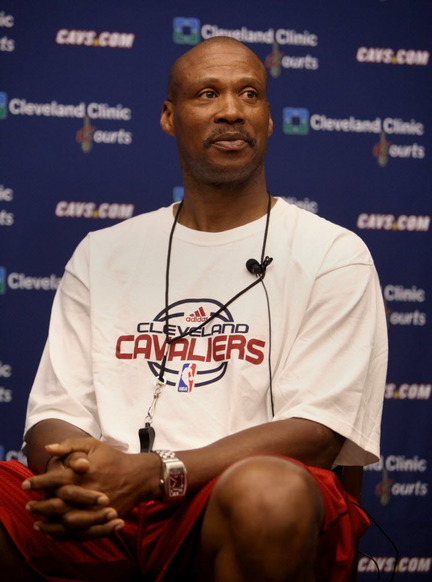 Cavs Archive
Cavs Archive  The Statistics Show Improvement
The Statistics Show Improvement
 The unofficial second half of the season went underway on Tuesday night. At this point, the Cavs are somewhat of an enigma. They have a sub-.500 record, but appear to play hard every single night and they look like a professional basketball team. The same could not be said about the Cavs in their previous campaign.
The unofficial second half of the season went underway on Tuesday night. At this point, the Cavs are somewhat of an enigma. They have a sub-.500 record, but appear to play hard every single night and they look like a professional basketball team. The same could not be said about the Cavs in their previous campaign.
There are specific areas that show actual improvement. One of those areas is in point differential. In 2010-2011, the Cavs were dead-last in the league and were outscored by an average of a whopping 9.0 points per game. The Cavs are showing signs of progress and despite being outscored by 4 points per game. The team is in 23rd place in the league and has a long way to go, but a difference of 5 points per game is significant.
The Cavs are actually scoring less points per game this season than the previous year. The league has taken a step back offensively, which could account for the improved standings in most offensive categories despite the reduced offensive output. Previously, the Cavs were scoring 95.5 points per game (which ranked them 25th overall). Currently, the Cavs are scoring 93.7 points per game which is good enough for 19th best in the league. The lowest scoring team from last year was the Milwaukee Bucks who were scoring 91.9 points. In this present season, the Charlotte Bobcats are the worst in the league with 86.7. Although the Cavs are not scoring that many more points, the league trend is lower than previous years and the Cavs are showing improvement. One has to think that adding in Kyrie Irving to the mix has a lot to do with explaining the improvement.
Defensively the Cavs are also showing promising improvement. Examining points per game allowed only tells part of the story because each team plays at a different pace. For example, the Denver Nuggets play at the fastest pace in the league. They use 97.2 possessions per game. The New Orleans Hornets are the slowest team in the league and they use 90.9 per game. If you were to simply look at the points per game allowed, Denver would appear to be a much worse team because they are allowing 101.1 points per game compared to New Orleans’ 93.4. In reality, Denver is not that much worse defensively than New Orleans when you look at their opponent’s field goal percentage (44.6% for New Orleans compared to 45.3% for Denver).
The Cavs are showing signs of progress defensively. Previously, they were the 27th worst defensive team and their opponents were scoring on 47.5% of their field goals. They have moved up to 20th place and are giving up 45.1% shooting. This could be attributed to the worse shooting during the lockout-shortened season, but it is also feasible that it is a result of Byron Scott’s defensive system being in place for more than a year.
The loss of Anderson Varejao has either been short enough that it is not impacting the rebounding of the Cavs or another explanation could be that the other Cavaliers are picking up the rebounding slack. In 9 games in the months of February, Tristan Thompson grabbed an average of 8.6 rebounds per game. Overall as a team, the Cavs are out-rebounding their opponents by 2 per game. Last season, they were giving up 3.2 rebounds per game to the opposition. This is a difference of 5.2 rebounds per game. Of all of the improvements, rebounding appears to be the most drastic. Another metric is the percentage of rebounds a team pulls in. Currently, the Cavs get 51.2% of all rebounds compared to 48.1% last year. There is a real improvement in the rebounding that probably can only be explained by better rebounding as opposed to a spurious explanation such as the league shooting at a lower percentage.
While the team is still far removed from their dominant days, the important thing to look for is that they are showing signs of progress across the board. Additionally, the rookies are developing nicely. If the season were to end today, the Cavs would be out of the playoff picture. As long as the team buys into Byron Scott’s system and the individual players show signs of progress, the Cavs are on track to right the ship sooner than later.
As usual, all stats used are courtesy of ESPN.com
- NBA Announces 2013-2014 Schedule
- Browns Ink Sharknado
- Sharknado A No-Show For Rookie Camp
- Trent Richardson Out Until Training Camp
- Browns Sign Brandon Jackson
- Carrasco Suspended Eight Games
- Browns Add to Wide Receiver Depth with David Nelson
- Browns Need to Learn from Past Draft Mistakes
- Browns Release Chris Gocong and Usama Young
- Browns Missing on Grimes Disappointing, But Not The End
The TCF Forums
- Movies coming out
rebelwithoutaclue (Tuesday, January 21 2014 12:56 PM) - 2015 Recruiting
jclvd_23 (Tuesday, January 21 2014 12:38 PM) - The 2014 Offseason Thread
Larvell Blanks (Tuesday, January 21 2014 12:25 PM) - Official- Browns Coach Search/Rumors
Larvell Blanks (Tuesday, January 21 2014 11:53 AM) - Chris Grant's first 3 drafts
Kingpin74 (Tuesday, January 21 2014 10:13 AM) - Mike Brown
YahooFanChicago (Monday, January 20 2014 11:15 PM) - 2014 Hoops Hockey Hijinx
jpd1224 (Monday, January 20 2014 4:44 PM) - 2014 Recruiting
jclvd_23 (Monday, January 20 2014 2:26 PM) - Wish List - #4 Pick
Hikohadon (Monday, January 20 2014 1:26 PM) - #1 overall pick Anthony Bennett
TouchEmAllTime (Sunday, January 19 2014 1:28 PM)



